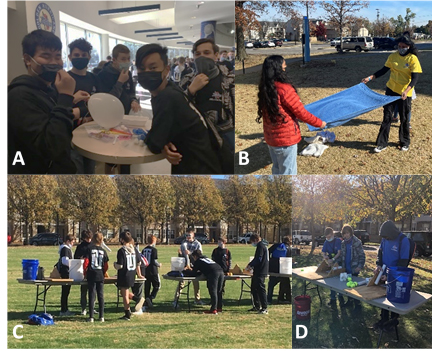
TU Holds 4th Annual Native American STEM Competition & Teacher Conference
EPSCoR Update - Dec. 2021
On November 22, 2021, over 1,000 middle school and high school students from across the state participated in a one-day competition during the 4th Annual Native American Science, Technology, Engineering, and Mathematics (STEM) Competition, which was concurrently held with a Teacher Conference at The University of Tulsa.
School teams, composed of five students each, competed against other school teams in diverse and engaging STEM activities, including cryptography, math, and car design challenges, an egg drop engineering project, and more. Each team was comprised of a majority of Native American students. These teams were nominated by a teacher, who was onsite at the concurrent Teacher’s conference.
The annual program was presented by Dr. David Brown, Associate Professor of Education at The University of Tulsa, and was funded by the Oklahoma Established Program to Stimulate Competitive Research (EPSCoR), the National Science Foundation, and The University of Tulsa.
“Our major goal is to increase STEM participation among underrepresented groups with emphasis on Native Americans in the K-12 demographic,” Brown said. “This education program will help prepare our students to pursue STEM-related degrees,” he added.
Student teams competed in one of three divisions: All-girls teams, all-boys teams, and co-ed teams. A variety of interactive, hands-on challenges (e.g., scavenger hunt, cryptography, engineering challenge) as well as a scientific poster competition increase STEM and climate/meteorological awareness, inspire creativity and engage the cultural sensitivity of participants. As a component of participation, students must present a digital journal, highlighting their experiences, to their schools after the event. Awards were given to the winning teams in each division.

Pictured above: Students participating in A) Egg Drop, B) Math Toss, and C&D) Slingshot Challenges.
The teachers who brought students to the event participated in a concurrent conference that addressed teaching STEM to underrepresented minorities and provided tools to successfully implement STEM in today’s classroom. A post-event teacher workshop will explore the conference’s impact on students in the classroom. Participating teachers may receive Graduate credit.
________________
Acknowledgment: Funding for this project was provided by NSF EPSCoR RII award #OIA-1946093.
